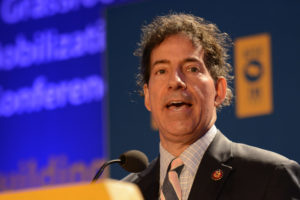
U.S. Senate Minority Leader Chuck Schumer
As many people know, last Friday, 10 U.S. Senate Democrats, led by Minority Leader Chuck Schumer, voted with Republicans to end their filibuster of the temporary Republican spending bill (“Continuing Resolution” or “CR”) to fund the federal government for the remainder of Fiscal Year 2025. This action advanced the bill to a Senate vote. Once that happened, the result was preordained: Republicans, with 53 Senators, had more than enough votes to pass the CR by simple majority vote.
As background, Republicans hold the majority in both the U.S. Senate and U.S. House, and have been in the House majority since January 2023. It is their responsibility to come up with the votes to pass spending bills to keep the federal government open. They have repeatedly failed at their job. For example, last fall, the House failed to pass a government spending bill. Typically, the Republicans then come begging to the Democrats to provide the votes to pass such bills, or at least temporary CRs, to avoid a government shutdown. In return for their votes, it is natural for Democrats to ask for and get something in return, such as provisions to maintain certain programs or funding levels that Democrats favor, or the non-inclusion of certain objectionable Republican provisions.
This time, however, Schumer and nine other Democratic Senators caved to the Republicans, getting nothing. In voting to end the filibuster, then voting for the CR itself, they went against every Democratic U.S. House member except one, and against more than two-thirds of their fellow Democratic Senators. According to Common Dreams:
The bill proposes $13 billion in cuts to non-military spending and imposes no constraints on the Trump administration or unelected billionaire Elon Musk as they eviscerate federal agencies and unlawfully withhold spending authorized by Congress.








